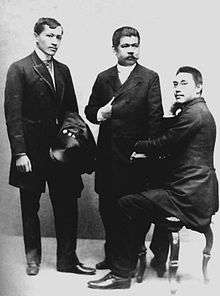La solidaridad
 | |
| Type | Biweekly newspaper |
|---|---|
| Format | Broadsheet |
| Editor |
Graciano López Jaena Marcelo H. del Pilar Jose Rizal |
| Founded | 1889 |
| Political alignment | Independent |
| Language | Spanish |
| Ceased publication | 1895 |
La Solidaridad (The Solidarity) was an organization created in Spain on December 13, 1888. Composed of Filipino liberals exiled in 1872 and students attending Europe's universities, the organization aimed to increase Spanish awareness of the needs of its colony, the Philippines, and to propagate a closer relationship between the colony and Spain.[1]
Headed by José Rizal's cousin, Galicano Apacible, it also issued a newspaper of the same name which was published in Barcelona, Spain on February 15, 1889. It was edited by Graciano López Jaena and later on by Marcelo H. del Pilar.[2] The newspaper published not only articles and essays about the economic, cultural, political, and social conditions of the country, but also current news, both local and foreign, and speeches of prominent Spanish leaders about the Philippines.
Members
- Dr. José Rizal (Laong Laan at Dimasalang)
- Marcelo H. del Pilar (Plaridel)
- Graciano Lopez Jaena (Fray Botod/Diego Laura)
- Antonio Luna (Taga-Ilog)
- Mariano Ponce (Tikbalang,Kalipulako,Naning) or Tae
- Jose Maria Panganiban (Jomapa)

Other members
- Pedro Paterno
- Antonio Maria Regidor
- Isabelo de los Reyes
- Eduardo de Lete
- José Alejandrino
- Jose Luis Guerra
- Robert Lacamra
International members
- Professor Ferdinand Blumentritt (Austrian ethnologist)
- Dr. Miguel Morayta Sagrario (Spanish historian, university professor and statesman)
Note: Some friends of the Propaganda Movement also contributed
Trivia
- Laong-Laan (José Rizal's pen name) used as the same name of a railway station
- Graciano Lopez Jaena was the founder of La Solidaridad
History
In order to find a venue where the desire of the Propaganda Movement towards achieving assimilation can be expressed, La Solidaridad was established.[3] The first issue of La Solidaridad came out on February 15, 1889. Published fortnightly, it served as the principal organ of the reform movement for six years.[2]
In general, its funds came from the Comite de Propaganda in the Philippines. Rizal was first offered the position of its editorship. However, he declined because he was very busy annotating Antonio de Morga's Sucesos de las Islas Filipinas in London. In the end, Graciano López Jaena showed an interest in becoming the editor.[2]
On April 25, 1889, La Solidaridad published the letter entitled "The aspirations of the Filipinos" which was written by the Asociación Hispano-Filipina de Madrid (English: Hispanic Filipino Association of Madrid).[3] It pursued desires for:[4]
- Representation in the Cortes
- Abolition of censure
- An expressed and definite prohibition of the existing practices of exiling residents by purely administrative order, and without a writ of execution from the courts of justice.
On December 15, 1889, Marcelo H. del Pilar replaced Graciano López Jaena as the editor of La Solidaridad.[2][3] Under his editorship, the aims of the newspaper expanded and drew the attention on politicians and even Spanish ministers.[3] Using propaganda, it pursued desires for:
- That the Philippines be a province of Spain
- Representation Filipino priests instead of Spanish friars — Augustinians, Dominicans, and Franciscans — in parishes and remote sitios
- Freedom of assembly and speech
- Equal rights before the law (for both Filipino and Spanish plaintiffs)
After years of publication from 1889 to 1895, La Solidaridad had begun to run out of funds. It ceased publication on November 15, 1895, with 7 volumes and 160 issues. In del Pilar's farewell editorial, he said :
| “ | We are persuaded that no sacrifices are too little to win the rights and the liberty of a nation that is oppressed by slavery.[5] | ” |
Notable contributors
Several writers contributed to La Solidaridad over its six years of existence, like Antonio Luna, Anastacio Carpio, Mariano Ponce, Antonio M.a Regidor, Jose Maria Panganiban, Isabelo de los Reyes, Eduardo de Lete, José Alejandrino, and Pedro Paterno. One of the most prolific contributors though was Rizal's confidant Ferdinand Blumentritt, whose impassioned defense of the Filipino interests was said to have been inspirational to the other writers and the readers of the newspaper alike.[3]
See also
Notes
- ↑ "José Rizal and the Propaganda Movement". Retrieved 2011-11-04.
- 1 2 3 4 "La Solidaridad and La Liga Filipina". Philippine-History.org. Retrieved 2011-11-04.
- 1 2 3 4 5 Schumacher, John N. (1973). The Propaganda Movement, 1880-1895: the creation of a Filipino consciousness (1997 ed.). Manila: Ateneo de Manila University Press. p. 333. ISBN 978-971-550-209-2.
- ↑ Hispanic Filipino Association of Madrid (April 25, 1889). "The aspirations of the Filipinos". Barcelona, Spain: La Solidaridad. Archived from the original on July 13, 2010. Retrieved July 19, 2010.
- ↑ http://www.knightsofrizal.be/la_solidaridad/default.html
References
- Constantino, Renato. A Past Revisited. Quezon City: Tala Publications, 1975.
- Zaide, Sonia M. and Gregorio F. Zaide. The Philippines: A Unique Nation. Manila: All-Nations Publishing, 1999.
- Zaide, Gregorio F. Philippine History and Government. National Bookstore Printing Press, 1984.
